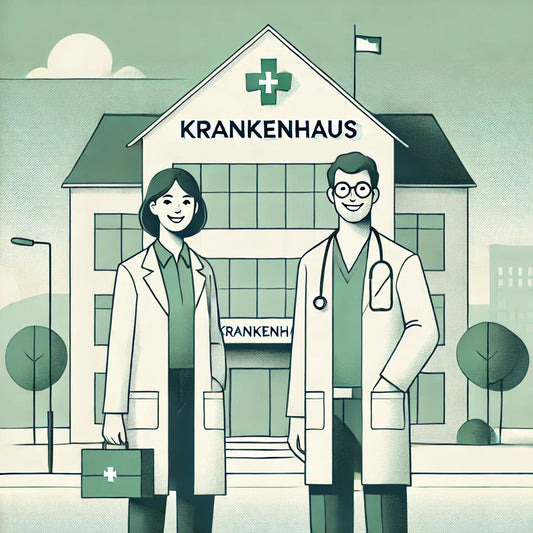The Defizitbescheid, aka. Zwischenbescheid, is an official notice issued by a German authority responsible for the recognition of foreign professional qualifications. This document plays a crucial role for foreign medical doctors seeking to start a medical residency in Germany. You can learn about the requirements for a medical residency in Germany here.
What is a Defizitbescheid?
The Defizit bescheid, or "deficit notice," is issued after the Landesprüfungsamt (LPA) or another competent authority has assessed your foreign qualifications. It identifies any deficiencies in your education or training compared to the equivalent German qualification. These deficiencies can be theoretical or practical and must be addressed through additional training or courses, and proved through necessary exams such as the Fachsprachenprüfung (FSP) and the Kentnnisprüfung (KP), before full recognition, aka. Approbation can be granted.
Why is a Defizitbescheid Important for Medical Residency in Germany?
The primary purpose of the Defizit bescheid is to outline the specific areas where your qualifications do not meet German standards when compared with the MBBS education in Germany. It provides a clear roadmap of the necessary steps you need to take to achieve full equivalence. This ensures that all medical professionals practising in Germany meet the country's rigorous standards, thereby maintaining high levels of competence and safety in regulated professions (reglementierte Berufe) like medical doctors, dentists and nurses.
The Deficit bescheid is also essential for applying for a §16d visa, intended for individuals undertaking qualifying measures in Germany. This visa allows you to stay in Germany while completing the recommended courses or training to achieve full recognition of your qualifications.
What are the Parts of a Defizitbescheid Application for Foreign Doctors?
After sending in your necessary documents either online, or by post, depending on the requirements of the LPA of the state you chose, you will have to be patient and wait for a few months for an answer. This is because there are many applicants from around the world standing in line along with you. Learn about the most common countries of origin for foreign doctors applying for a medical residency in Germany here.
The assessment is carried out by recognised professionals called "Gutachter" (eng. experts). Once completed, the Defizitbescheid sent to you will contain the following information relevant to your MBBS education and to your future starting a medical residency in Germany. This will include:
- Assessment of Qualifications: The document begins with an evaluation of your submitted qualifications, comparing them against the German standards for your profession.
- Identified Deficiencies: It details the gaps in your qualifications, specifying which theoretical knowledge or practical skills are lacking.
- Recommended Measures: The notice will recommend specific measures to bridge these gaps. This could include attending additional courses, undergoing practical training, or passing specific exams like the Fachsprachprüfung (medical language exam) or Kenntnisprüfung (knowledge exam). Learn what is a FSP exam in Germany, necessary for medical residency in Germany here.
- Validity and Conditions: The Deficit bescheid will also state the validity period of the recommendations and any conditions that must be met during this period.
Which Documents are Required for a Defizitbescheid Application
When applying for a Defizit bescheid for a medical Residency in Germany as a foreign doctor, you need to ensure that you have prepared and gathered all necessary documents, as defined on the website of Landesprüfungsamt (LPA) of the State in Germany you choose.
Here is a detailed list of the required documents and steps to follow:
- Personal Identification
- Valid passport
- Passport-sized photographs (as per biometric specifications)
- Educational Qualifications
- Certified copies of your medical degree and transcripts
- Certificates of completion for any postgraduate training or residencies
- Proof of clinical rotations and internships completed during your medical studies
- Language Proficiency
- German language certificate at least at B2 level (preferably C1), from recognized institutions like Goethe-Institut or Telc
- Professional Qualifications
- Proof of professional registration/medical license in your home country (depends on the state you choose)
- Good standing certificate from the medical council in your home country
- Detailed curriculum vitae (CV)
- Proof of Experience
- Work experience letters or references from previous employers
- Job descriptions detailing your clinical duties and responsibilities
- Financial Proof
- Evidence of financial stability, such as a blocked account with at least €1,027 per month for 2024
- Health Insurance
- Proof of health insurance coverage valid in Germany
- Application Forms
- Completed application form for the recognition of foreign professional qualifications
- Additional forms as required by the State authorities, such as the "Erklärung zum Beschäftigungsverhältnis" if you are involved in practical training
- Other Supporting Documents
- Any additional documents specified by the Landesprüfungsamt (LPA) of the State in Germany you choose.
Note: This is not an exhaustive list. For a complete list, make sure to go through the exact requirements of the State in Germany you choose to apply to. This is to ensure there are no unnecessary delays as they usually can set you back a couple of months, if you're lucky. (Some people even report delays of up to 12 months because of a small mistake in document preparation!)
How Much Time is Required for a Defizitbescheid?
The process of obtaining a Defizit bescheid can take several months, typically ranging from 5 to 9 months, depending on the complexity of the assessment and the specific state in Germany processing the application.
The Defizitbescheid is a vital document for foreign medical professionals aiming to start medical residency in Germany. It ensures that all necessary qualifications and skills are met, thereby safeguarding the quality and safety standards of professional practice in Germany. However, the bureaucratic hurdles are real, and the complexities of the process can burden foreign doctors already struggling with learning the German language.
How to Apply for a Defizitbescheid as a Foreign Doctor
Consider a foreign-trained doctor applying for recognition in Germany. This is the step-by-step progression of their application for a Defizitbescheid:
- Application: The foreign doctor must collect all of the documents required for an application of a Defizitbescheid and send them to the Landesprüfungsamt (LPA) of the state they choose ➜
- Assessment: The LPA reviews the doctor's medical degree, internships, and work experience ➜
- Defizitbescheid: The notice identifies gaps in specific medical procedures and language proficiency ➜
- Recommendations: The doctor is advised to complete a six-month practical training at a recognized hospital and pass the Fachsprachenprüfung ➜
- Visa Application: The doctor uses the Defizitbescheid to apply for a §16d visa, enabling them to stay in Germany and complete the recommended measures.
Apply for a Defizitbescheid with Confidence
Seeking guidance from professionals such as Dr Rohit Batra, who specialises in assisting foreign medical doctors, can be highly beneficial in navigating this complex process, ensuring you stay on your chosen timeline and save your precious energy and time for what truly matters.
Exclusive For High-Achievers: Accelerator Program
The team at Rohit Batra Teach is here to provide exceptional support every step of the way. Here’s how we will assist you:
1. Recognition/ Defizitbescheid
- We help you get your foreign medical qualifications recognized by German authorities and save you up to 6 months and 1000s of euros.
2. Visa Application
- Applying for the correct visa (e.g., § 16d Abs. 1 AufenthG for recognition of foreign qualifications) can be challenging. We guide you to ensure your visa application is accepted, allowing you to focus on your residency preparations.
3. German Language
- Mastering medical German language is essential for practising as a foreign doctor in Germany. Prepare with professional teachers with RBT for medical language exams and attend Hospitations to gain practical language experience.
4. Residency Application
- Once your qualifications are recognised and your language requirements are met, we will help you navigate through the application process, from approbation to residency, help you prepare for interviews.
Designed for high-performing individuals, our goal is to streamline your journey to securing a medical residency in Germany, allowing you to focus on what matters most—your career development.
"Here we support the next generation of foreign medical doctors start a medical residency in Germany. Discover our customised programs designed to accelerate your path to a German medical residency program. Start your journey today!"
Stay in touch 🫶




